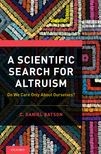 A Scientific Search for Altruism: Do We Only Care About Ourselves?
A Scientific Search for Altruism: Do We Only Care About Ourselves?
Contents
-
-
-
-
-
-
-
-
-
-
-
-
Direct Antecedents of Empathy-Induced Altruism Direct Antecedents of Empathy-Induced Altruism
-
Perceiving Another as in Need Perceiving Another as in Need
-
Is innocence necessary for empathic concern? Is innocence necessary for empathic concern?
-
Vulnerability. Vulnerability.
-
Who can perceive another as in need? Who can perceive another as in need?
-
The necessary cognitive abilities. The necessary cognitive abilities.
-
Who has these abilities? Who has these abilities?
-
-
Valuing the Other’s Welfare Valuing the Other’s Welfare
-
Why not similarity instead of valuing? Why not similarity instead of valuing?
-
Why not an imagine–other perspective? Why not an imagine–other perspective?
-
Intrinsic, not extrinsic, valuing. Intrinsic, not extrinsic, valuing.
-
-
-
A Likely Distal Antecedent A Likely Distal Antecedent
-
William McDougall’s Parental Instinct and Tender Emotion William McDougall’s Parental Instinct and Tender Emotion
-
The human parental instinct. The human parental instinct.
-
Extending it. Extending it.
-
-
Evidence Regarding Generalization of Tender Feelings and Parental Care Evidence Regarding Generalization of Tender Feelings and Parental Care
-
Distinguishing Parental Care From Inclusive Fitness Distinguishing Parental Care From Inclusive Fitness
-
An Experiment to Test for Generalized Parental Care An Experiment to Test for Generalized Parental Care
-
Empathic concern felt for Kayla. Empathic concern felt for Kayla.
-
Predictions and results. Predictions and results.
-
-
-
Limits on Empathy-Induced Altruism Limits on Empathy-Induced Altruism
-
The Scope of Empathic Concern The Scope of Empathic Concern
-
Empathy Avoidance Empathy Avoidance
-
The Strength of Competing Concerns The Strength of Competing Concerns
-
-
Conclusion Conclusion
-
-
-
-
-
-
-
Cite
Abstract
To conclude—even tentatively—that empathy-induced altruism is within our motivational repertoire poses a puzzle: How is it possible? This question demands an answer at two levels. We need to know (a) the conditions necessary to produce empathic concern and altruistic motivation in our lives today and (b) how altruism could have become part of our nature. The direct antecedents of empathy-induced altruism seem to be perceiving another as in need and valuing the other’s welfare. The most plausible distal (evolutionary) antecedent is generalized parental care. This care is different from the evolutionary biologists’ idea of inclusive fitness (care proportional to degree of kinship). An experiment that tested for generalized parental care is described. Finally, three limits to empathy-induced altruism are considered: the scope of empathic concern, empathy avoidance, and the strength to competing concerns.
Sign in
Personal account
- Sign in with email/username & password
- Get email alerts
- Save searches
- Purchase content
- Activate your purchase/trial code
- Add your ORCID iD
Purchase
Our books are available by subscription or purchase to libraries and institutions.
Purchasing information| Month: | Total Views: |
|---|---|
| October 2022 | 1 |
| November 2022 | 3 |
| December 2022 | 3 |
| February 2023 | 1 |
| March 2023 | 1 |
| July 2023 | 2 |
| August 2023 | 2 |
| September 2023 | 2 |
| October 2023 | 2 |
| March 2024 | 4 |
| April 2024 | 5 |
| June 2024 | 1 |
| July 2024 | 2 |
| August 2024 | 3 |
| October 2024 | 1 |
| March 2025 | 2 |
| April 2025 | 2 |

Get help with access
Institutional access
Access to content on Oxford Academic is often provided through institutional subscriptions and purchases. If you are a member of an institution with an active account, you may be able to access content in one of the following ways:
IP based access
Typically, access is provided across an institutional network to a range of IP addresses. This authentication occurs automatically, and it is not possible to sign out of an IP authenticated account.
Sign in through your institution
Choose this option to get remote access when outside your institution. Shibboleth/Open Athens technology is used to provide single sign-on between your institution’s website and Oxford Academic.
If your institution is not listed or you cannot sign in to your institution’s website, please contact your librarian or administrator.
Sign in with a library card
Enter your library card number to sign in. If you cannot sign in, please contact your librarian.
Society Members
Society member access to a journal is achieved in one of the following ways:
Sign in through society site
Many societies offer single sign-on between the society website and Oxford Academic. If you see ‘Sign in through society site’ in the sign in pane within a journal:
If you do not have a society account or have forgotten your username or password, please contact your society.
Sign in using a personal account
Some societies use Oxford Academic personal accounts to provide access to their members. See below.
Personal account
A personal account can be used to get email alerts, save searches, purchase content, and activate subscriptions.
Some societies use Oxford Academic personal accounts to provide access to their members.
Viewing your signed in accounts
Click the account icon in the top right to:
Signed in but can't access content
Oxford Academic is home to a wide variety of products. The institutional subscription may not cover the content that you are trying to access. If you believe you should have access to that content, please contact your librarian.
Institutional account management
For librarians and administrators, your personal account also provides access to institutional account management. Here you will find options to view and activate subscriptions, manage institutional settings and access options, access usage statistics, and more.